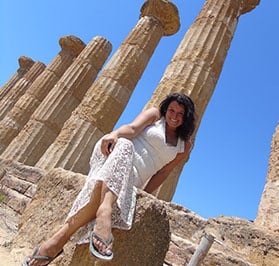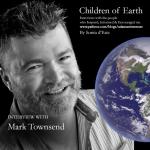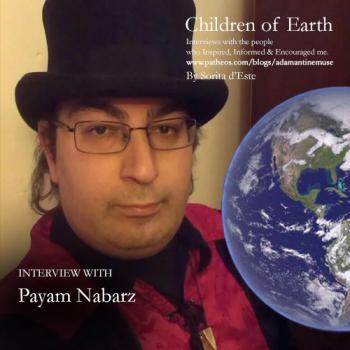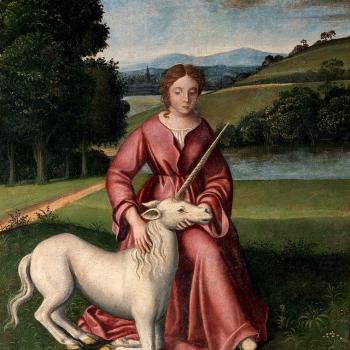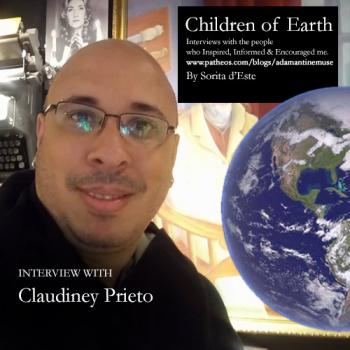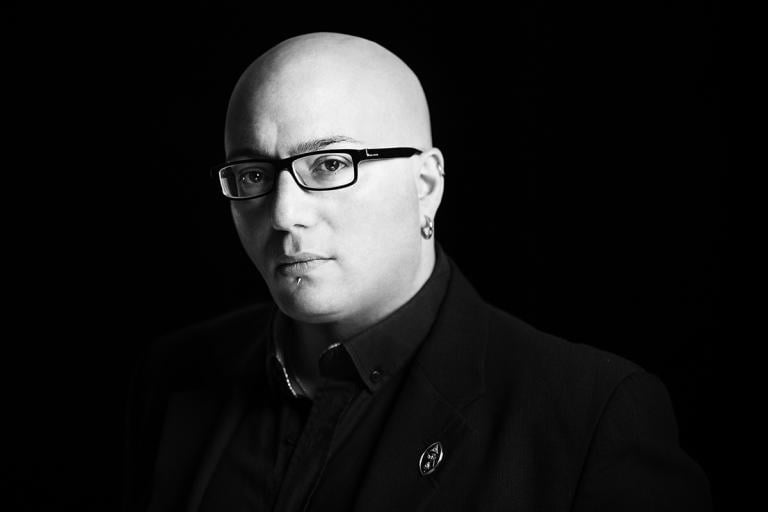
In recent years Marco Visconti has spoken out in public and with erudite dignity about what he considers to be problematic areas of practice and culture within an esoteric order he was formerly a member of. Some may debate whether or not speaking out in the way Marco did this is right or wrong, or perhaps have different opinions on whether they agree with the facts of what Marco wrote or not– but that is somewhat beside the point. Speaking out with the motivation of protecting what is sacred to you and doing so with composure takes strength, courage and conviction. Marco appears to have all of these qualities, and while some may have walked away in a fit of anger, he continues to have a passion and love for the Mysteries and Magic of his chosen path.
I first met Marco a few years ago in Glastonbury, and I remember our time together talking about this and that occult subject fondly. Before that, I only knew him through connections related to my work as a publisher, and his work for Treadwells – an established esoteric establishment in London. Since our meeting, I have taken the time to read many of Marco’s articles and social media ponderings, and I continue to be impressed with his passion for progressive approaches to occult practices rooted in history.
Marco spent years as a professional musician and was a member of XP8 and Faderhead. Today he is a Freemason and Thelemite and is known within esoteric circles for his work re-activating the Ecclesia Gnostica Universalis (EGU) and his knowledge and understanding of the work produced by the occult writer Aleister Crowley. He organises and facilitates workshops teaching the principles of Thelema, Rosicrucianism and Esoteric Freemasonry outside the boundaries of the oaths and secrecy.
In this interview, I ask Marco to share a little more about where it all started for him, his views on Thelema, the EGU, Arete and about being Italian.
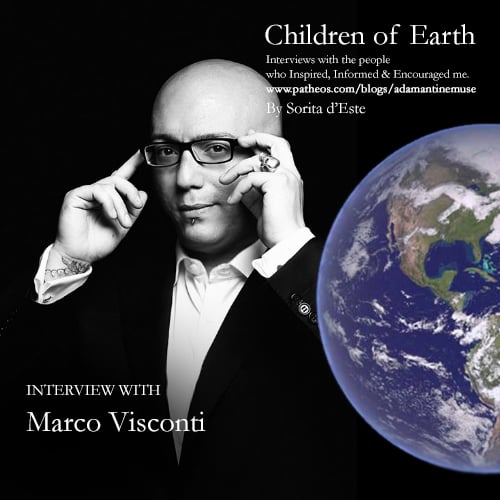
Children of Earth
People who Inspired, Informed or Encouraged me.
Interview with Marco Visconti
by Sorita d’Este
Sorita: Like many of us who have a deep fascination with magic and the occult, you have been exploring occult traditions since childhood. How did it all start for you?
Marco: With a fascination for mythology. Growing up in Rome, everywhere I turned as I walked the millennia-old streets with my parents I could see the signs of the Gods around me everywhere, still alive despite the weight of the Vatican trying to suffocate them out of existence once and forever. I started reading everything I could on them, and yet soon enough I realised that I was not going to resonate directly with the divine tales of those who were worshipped in the land of my birth, but rather with two more distant families: the Gods of the Celts, and the Gods of Egypt, which eventually led me towards a very private practice honouring those we find named in the Welsh Mabinogi through shamanism and witchcraft, and a more outwardly one through Thelema.
It would take many more years however for all of this to truly crystallise in me, and the path that led me to where I stand nowadays includes finding Aleister Crowley named in an Italian comic book, Martin Mystère, in the summer of 1990, and following the breadcrumbs ever since, moving from Peter Kolosimo’s books on Earth Mysteries to Alan Moore and Grant Morrison, through industrial music and the early mailing lists such as alt.magick and Yahoo Groups, IRC chat rooms, and eventually finding my first teachers by the tail end of the 90s.
Quite a ride that did not seem to make much sense at the time, but I can now see how everything happened exactly how it was supposed to do.
Sorita: For some years you were deeply involved with the Ordo Templi Orientis, the magical order so closely associated with the infamous Aleister Crowley and his philosophy of Thelema. You have since resigned from the Order. Do you still consider yourself a Thelemite; and if so – what does it mean to be a 21st century Thelemite?
I considered myself a Thelemite long before my involvement with Ordo Templi Orientis, something that came after 15 years as an initiate of the A∴A∴ – the “other” Thelemic group – so I believe it’s safe to say it’s unlikely that will ever change. Despite the countless shortcomings I came to face during my years in O.T.O. and despite knowing well how it’s all well beyond repair on those shores, I am still convinced that Thelema works, and am deeply invested in finally evolving it out of the shackles of the past in order for it to reach its full potential. A potential that so far has been squandered by a generation that was, simply put, not up to the task.
Being a 21st century Thelemite implies first and foremost being ready to change your perspective on what needs to be done. To find and do your Will means precisely that, becoming You – and not parroting Aleister Crowley till the end of time while avoiding facing the fact he was also deeply problematic. It means leaving behind systems and structures that have proven again and again to just not work anymore, such as “Orders” that forget spiritual advancement in lieu of cheap politics and that allow abuse while fostering a culture of omertá. None of this is Thelema, and none should be tolerated any longer only because it is genuinely challenging to face the ordeals of initiation on your own: we are social animals, and there is great value in community. But when that community becomes toxic, as initiates we must accept yet another ordeal and move on from it.
The future is bright, I am certain of it. It simply requires a little more Work that we thought at first, because in the Age of Information trickle-down Gnosis works just as well as trickle-down economy…
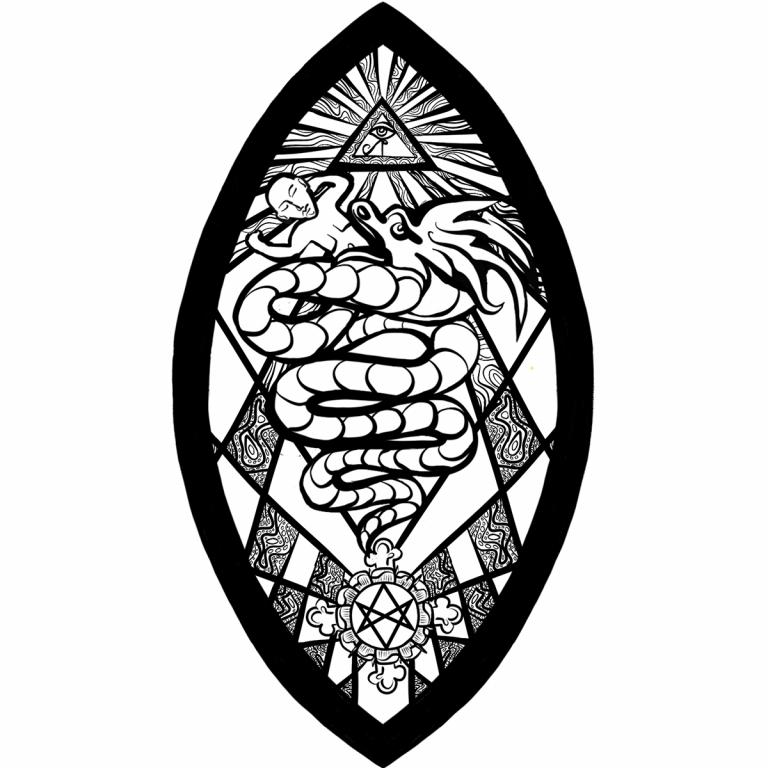
Sorita: At the Autumn Equinox of 2018 you reactivated the lesser-known Ecclesia Gnostica Universalis (EGU). What is the EGU and why did you choose the Autumn Equinox to revive it?
Ecclesia Gnostica Universalis is an early reaction towards the restrictions placed by the American leaders of O.T.O. over Thelema. Aleister Crowley penned the Gnostic Mass as the ritual of his own Ecclesia Gnostica Catholica (EGC) and to simplify further the initiatory message of that particular Order, which is sexo-alchemical in nature and aiming towards a complete transmutation of the Adept performing its rites – at least on paper. It was his idea that as the O.T.O. expanded and kept training such Adepts on the finer points of this formula of attainment, there would emerge a need to reverberate these very same teachings to a wider, maybe less involved audience, and by doing so also playing into a basic human need – that of fulfilling a religious aesthetic.
It turned out that things played rather differently, with the revived O.T.O. missing far too many documents and teachings to be truly effective, and with a botched attempt of elevating the church aspect over everything else – mainly also to keep the tax-free status in the U.S.A.
However, it did create over the past 40-odd years a generation of Thelemites who still perceive the religious aspect as the sole aspect of Thelema, and so already in the 90s a group of high ranking O.T.O. members, and Bishops in EGC, being wary of a sudden change in the policy by the then- and current leadership that would make impossible for honest seekers to celebrate the Gnostic Mass if not also members of specific Degrees in O.T.O., came together and provided this alternative. You can read more in detail on our website, here.
What I am doing now is simply standing on the shoulders of giants, and being well aware of how many have been barred access to Priesthood and beyond on the basis that Ordination is tied to the first of the invitational Degrees of O.T.O. (aka, only those who toe the party line are allowed…), in re-activating EGU I am once again giving a chance to those honest seekers who want to explore the Gnostic and Thelemic Mysteries earnestly and with real dedication.
The choice of the Fall Equinox was done by looking at the Wheel of the Year, of course – one of those concepts that far too many Thelemites consider “old aeonic” missing the point completely, since we are still very much rooted onto this Earth. The Fall Equinox, being the middle harvest, it naturally is the perfect time to reap what one has sown, and to look back while planning for the future: to me, indeed the best times for such a lofty endeavour as the resurrection of a Thelemic Church to stand against the restrictionists.
Sorita: I have in the past described myself as a Gnostic Theurgist, being an exact and literal description of my work; but also a way of avoiding inaccurate and limiting label boxes so passionately used in esoteric circles to describe a “path” or “tradition” an individual is involved with. What does ‘Gnosticism’ mean to you, and would you name yourself as a Gnostic?
Without a doubt, since for me a Gnostic is the seeker that strives to perfection, in order to truly receive the kind of direct, unsullied experience that can bring him ever closer to that final Truth at the end of the Search. Thelema is Gnostic by default, so to bring the two strands together was truly a no-brainer.
Sorita: I am personally of the opinion that we are living in what is probably the most magical age ever. So for me, it is frustrating to see that so many occultists continue to put their time and energy into re-creating and re-living the past glories of Secret Societies, Magical Orders and Witchcraft created a 100 or more years ago. Why is the EGU relevant to the 21st century?
You are touching on a very important point – as I said above already, by now I am absolutely convinced that the time for “Orders” is over. It rested on a scarcity of information that is simply not there anymore, and on a social infrastructure that was of a completely different pace than our own today. On that note, a book I suggest everyone should read is Alessandro Baricco’s “The Barbarians: An Essay on the Mutation of Culture”, which was published just before the advent of the age of social media and is incredibly enlightening in showing how we truly are a divide that historians will write about in the centuries to come.
That said, the magico-religious experience is not one that can be conveyed only through books, or blog posts, or YouTube videos: we still need the face to face experience, that transmission of the Gnosis we discussed briefly already. I have tested some of the new virtual reality temples that are becoming more and more available and I can tell you, they still can’t beat the real experience. Maybe that will change, and faster than we can foretell now, but for the time being those who will want to celebrate the Mysteries will still need a Mystery School – and in that, EGU is still relevant.
What we are trying to change however, is getting rid of the “open doors” policy we found in O.T.O. and creating a more familiar, coven-like approach, because we realised that Initiation, and the way towards Ordination, is something that the person knocking at the door must truly want and must be ready to work hard for – not something for which you pay meagre dues annually and mostly forget about.
All in all, I think EGU is a necessary reaction towards far too many layers of restrictions placed by those who elevated themselves as the arbitri elegantiarum of Thelema: it will serve its purpose in empowering a new generation of Adepts, but it might well be that once it has done that it will be reintegrated into the Current – very likely as humanity will experience yet another paradigm shift in the way we process information, and thus Gnosis itself.
Sorita: On the EGU’s website there is a glossary of terms, and I was delighted to see the term Arete included, for which is given the definition:
“ARETE: Means “virtue”. In Platonic ideal it is a reference to the importance of meaning above technical skill (techne). In other words it denotes mythological value within a literate framework or craft. Later philosophical movements would refer to this notion as “High Art” vs “Low Art”.”
Arete is sometimes also linked to knowledge and excellence in everything you do. It is also, of course, related to fulfilling one’s potential and living a life with good solid moral virtues. Plato, Aristotle and many other philosophers taught it as part of their work. How does Arete manifest itself in your life philosophies?
Marco: I am genuinely happy you took the time to explore the lesser standout articles on the website! To me, the concept of Arete is similar, if not identical, with the concept of True Will in Thelema: by knowing, gnostically, who you are and what you are here to do, you cannot but strive towards absolute excellence in fulfilling your role. It’s obviously easier said than done, but I cannot help but think that the Adept must face constant challenges, in order to fight the tendency of becoming complacent and thus, static – while the Fifth Power of the Sphinx is “to go”. Titles, grades, degrees, they all mean nothing in the end, as with every other mundane accolade: all that matters is the ability to reverberate the Gnosis one has attained and reflect it back onto the World and those who are willing to receive it: and that’s a 24/7 job from which you can never really walk away!
Sorita: In very different ways, you and I have both walked in the same two worlds: Music and the Occult. Looking back, do you feel that these two passions of yours intertwine, or otherwise have something in common? And if so, how?
Marco: to me, they are both ways through which Art – with a capital A – manifests itself. While I have never overtly made music that could be classed as “esoteric”, as many others have done (from Coil to Behemoth and beyond), you can find much subtler references across my entire catalogue, and it is always interesting to hear when someone approaches me having found one. I personally like the idea of not pushing ideas into people’s heads, so that instead they can find the hints left scattered around for themselves and decide what to do with them. From time to time, such seeds are left untouched for years, maybe decades, before they can sprout at the right time, and I find that music is the perfect medium for this kind of transmission.
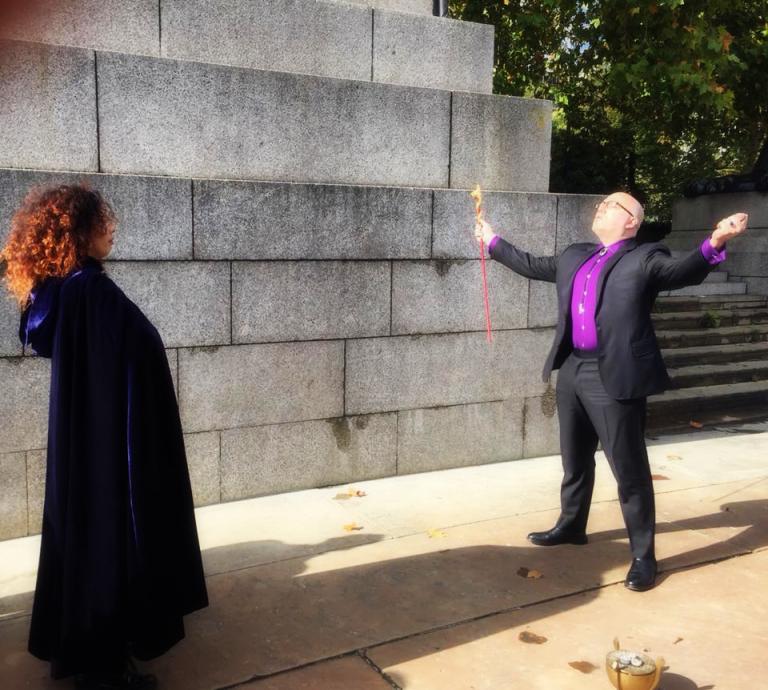
Sorita: You are Italian born, and moved to the UK some years ago after completing your education in Rome and Milan. How has your Italian heritage influenced your interest in the occult?
Marco: Not at all. I am well aware that being Italian is somewhat a prized heritage in many different occult groups and traditions, but for me it meant growing up in an oppressive Catholic environment with next to no choices to find like-minded people, bookshops, events, and so on. Basically everything far too many people take for granted here in London! Couple this with the fact that, as I said already, I never really “clicked” with the Roman pantheon and religion, you can see that for me it was always about leaving Italy behind. There was a moment (in time) when I would get rather annoyed at the fetishisation around ideas like “stregheria”, which never truly existed except perhaps in the mind of very prolific and inventive American authors, but nowadays I realise it’s simply a way to pay tribute to a mythical landscape that inspired the Work onto these people.
Sorita: What do you believe the most important qualities are that a seeker looking for their first occult group should be looking for when they are looking for their first group or teacher?
Marco: this is a tricky one… personally, I would look only for people proven to be in possession of one of the highest secrets of all magick – “having your sh*t together” 🙂 Of course one can be blinded by sonorous names and degrees, and being swayed by promises of true occult knowledge and participation in exciting and exotic rituals, but a teacher should be first and foremost someone that the seeker can trust, and that can look up to as a source of inspiration also outside the temple.
And by that I mean someone who can pay their bills, can afford a meal out every now and again, or a trip to that interesting circle of stone they always speak about: it might sound obvious, but far too many times I have met with people who pretend to be so advanced on their path, only to be easily called out on the fact they had no control over Malkuth – to use a kabbalistic reference. Of course your mileage may vary when it comes to the way to quantify that kind of control, but I believe that unless your tradition advocates for poverty, being unable to prove you “have your sh*t together” is a clear sign of cognitive dissonance.

Sorita: Is there something in the so-called Occult Scene which you would like to see change in your lifetime?
Marco: to finally move beyond the Victorian delusion about Orders and trickle-down Gnosis, hidden in secrecy that could only exist in a world where people still communicated via letter only and where travel between countries was difficult if not downright dangerous.
The Age of Information changed it all, and while we are still nowhere close to the utopia envisioned by the pioneers of Chaos Magick in the 90s, we are indeed moving towards a completely different kind of spirituality, one that will require a different matrix of initiation. Meeting in a tyled Lodge will always have its value, but we can’t fool ourselves in believing what happens behind those tyled doors is truly “secret”. The very concept of secrecy, and of Silence, is forever changed by these mercurial times we live in, and it’s time for those in charge of teaching the hidden Mysteries of Nature and Science to fully embrace it, and find a new model.
Sorita: Where do you see yourself 20 years from now?
Marco: to be very honest with you, given the kind of reckless life I led while on tour for the best part of my 20s and 30s, I never thought I would make it part 35! I am 41 now, and in the past few years, my life slowed down considerably so that I can envision a moment in the future where I am finally hitting the 60s… I think I will be just an older, maybe wiser version of myself, still Aspiring to a higher understanding of the Mysteries of this world and those beyond it. I think I will finally have found the time to write the book I have been toying with for a while, and who knows, maybe I would have penned another one too. I definitely see myself continuing to teach, because I am well aware how the more mainstream Thelemic organisations dropped the ball already, and the kind of miracle needed for that to change is of gargantuan proportions 🙂
Trivialities:
Your favourite book of all time? “Oceansea” by the Italian author Alessandro Baricco.
Your favourite character from history? Giuseppe Garibaldi.
Your favourite element? Fire.
Your favourite food? I don’t think I have one… as long as it’s tasty, I will gladly eat it!
Your favourite number? 23
Your favourite planet? Jupiter
Your favourite plant? The Willow Tree
Your favourite stone? Amethyst
Your favourite Tarot / Oracle deck? The Crowley/Harris “Thoth” Tarot
Your sun sign? Gemini
Thank you to Marco Visconti for taking the time to participate in the Children of Earth project! I enjoyed finding out more about him – learned quite a bit – and I hope you did too! And if you did, please take the time to share and comment – and to find out more about his work by visiting his website.
More information:
You can find out more about Marco and his work by visiting his website: www.marcovisconti.org and Ecclesia Gnostica Universalis (EGU).
Read The Wasteland, Marco’s article about why he left the OTO, and The Aftermath.
Further Reading:
While Marco is pondering writing his book, he recommends you read the following titles.
The Weiser Concise Guide to Aleister Crowley
Alchemy & Mysticism by Alexander Roob
Courtly Love: The Path of Sexual Initiation
Gnosticism: New Light on the Ancient Tradition of Inner Knowing
HRILIU: Symbolic Explorations of the Gnostic Mass
Naturalistic Occultism: An Introduction to Scientific Illuminism

